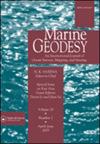The 2019 East Coast Slow Slip Event, New Zealand: Spatiotemporal Evolution and Associated Seismicity
IF 1.4
4区 地球科学
Q2 GEOCHEMISTRY & GEOPHYSICS
引用次数: 2
Abstract
Abstract Slow slip events (SSEs) are interpreted as the transient quasi-static fault deformation in the deep transition zone from locked to freely slipping in many subduction zones. Using continuous Global Positioning System (cGPS) data collected in New Zealand, we estimate the spatiotemporal evolution model during the 2019 SSE and analyze the influence of subduction interface heterogeneity on seismicity during SSEs at the Hikurangi margin. The results reveal that the 2019 SSE extends from the northern (Gisborne) to the central (Hawke’s Bay) Hikurangi subduction interface and decays rapidly within approximately 3-4 weeks. It releases a total seismic moment of about 4.83 × 1019 N·m (Mw 6.8), with a significant slip in Gisborne and a secondary slip in Hawke’s Bay. The slip depths are similar, but peaks, durations, and rates differ slightly. By combining previous SSEs (2011-2019), diverse characteristics are concluded, i.e., shorter duration and more frequency in Gisborne and relatively longer duration and less frequency in Hawke’s Bay. The seismicity offshore and onshore indicates along-strike variations, which appear to be spatially correlated with the variations in topography, such as subduction seamounts. The heterogeneities on the subduction interface are related to the spatiotemporal distribution of SSEs and seismicity along the Hikurangi margin.2019年新西兰东海岸慢滑事件:时空演变和相关地震活动
慢滑事件被解释为在许多俯冲带中由锁滑到自由滑动的深过渡带的瞬态准静态断层变形。利用在新西兰采集的连续全球定位系统(cGPS)数据,估算了2019年南太平洋地震带的时空演化模型,并分析了俯冲界面非均质性对Hikurangi边缘南太平洋地震带地震活动性的影响。结果表明,2019年SSE从北部(Gisborne)延伸到中部(Hawke 's Bay) Hikurangi俯冲界面,并在大约3-4周内迅速衰减。它释放的总地震矩约为4.83 × 1019 N·m (Mw 6.8),在吉斯伯恩有一次明显的滑动,在霍克斯湾有一次二次滑动。滑移深度相似,但峰值、持续时间和速率略有不同。结合以往的sse(2011-2019),得出Gisborne持续时间较短,频率较高,Hawke 's Bay持续时间较长,频率较低的不同特征。海上和陆上地震活动表现出沿走向的变化,这种变化在空间上与俯冲海山等地形的变化相关。俯冲界面上的非均质性与海库兰吉边缘的sse时空分布和地震活动性有关。
本文章由计算机程序翻译,如有差异,请以英文原文为准。
求助全文
约1分钟内获得全文
求助全文
来源期刊

Marine Geodesy
地学-地球化学与地球物理
CiteScore
4.10
自引率
6.20%
发文量
27
审稿时长
>12 weeks
期刊介绍:
The aim of Marine Geodesy is to stimulate progress in ocean surveys, mapping, and remote sensing by promoting problem-oriented research in the marine and coastal environment.
The journal will consider articles on the following topics:
topography and mapping;
satellite altimetry;
bathymetry;
positioning;
precise navigation;
boundary demarcation and determination;
tsunamis;
plate/tectonics;
geoid determination;
hydrographic and oceanographic observations;
acoustics and space instrumentation;
ground truth;
system calibration and validation;
geographic information systems.
 求助内容:
求助内容: 应助结果提醒方式:
应助结果提醒方式:


